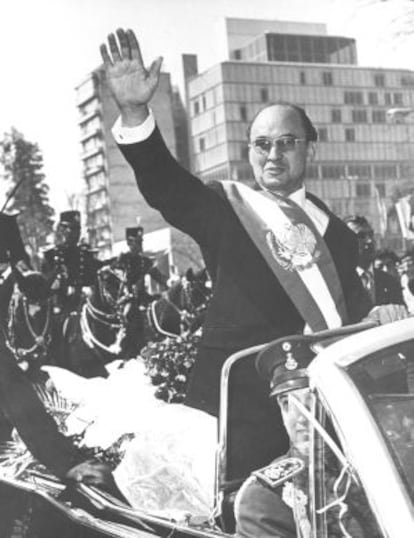WikiLeaks reveals darker side of Echeverría’s rule in Mexico
US embassy concerned by cited plot to kill successor


The United States thought that Mexico’s attitude to the 1973 coup in Chile was “cynical,” the latest batch of Wikileaks cables shows. The US State Department was worried about then-Mexican President Luis Echeverría’s sympathies for the government of Salvador Allende and about his concessions to Chileans – the country took in hundreds of refugees following the coup, including Allende’s widow, Hortensia Bussi, through its embassy in Santiago de Chile.
In order to find out about Echeverría’s real intentions, the US ambassador to Mexico, Joseph John Jova, met with the Mexican foreign minister, Emilio Rabasa, who confessed that although “Allende was a poor administrator and had little understanding of economic problems, he had nevertheless been a great patriot and a man who sincerely wished to end the oligarchy which had controlled Chile and effect a fairer division of resources.”
Rabasa admitted that Echeverría and Allende had been friends, and that this was the reason why Mexico took in around 700 refugees until 1974, then cut off relations with the military junta led by Augusto Pinochet.
These and other diplomatic concerns were revealed by WikiLeaks in more than 1.7 million classified cables from the 1970s, when Henry Kissinger was the US secretary of state. The second batch of leaked documents show around 61,000 messages between 1973 and 1976 involving Mexico, some 2,600 reports on the activities of Mexican leader Echeverría, and close to 1,200 documents on another ex-president, José López Portillo. The most frequently recurring themes in the communications between the US State Department and its embassy in Mexico were the Mexican reaction to the Chilean coup, the presidential succession, the guerrillas and the media.
Some of the cables from Ambassador Jova reported rumors that Echeverría was seeking to amend the Constitution to run for re-election, but noted that his own party, the PRI, did not support the idea. Later, Jova informed the US State Department about an alleged plot by Echeverría to assassinate his successor, José López Portillo, to extend his own term in office.
Some of the documents remain classified by the US government
“While most of these rumors have come from the private sector, the area most willing to accept that Echeverria would be capable of murder to extend his mandate, we are now picking up similar expressions of concern from the academic community,” wrote Jova. “We have long regarded such talk as symptomatic of the political climate, the cynicism and suspicion with which Mexicans regard the president rather than as an indication of what might actually happen.”
Yet because precedents existed, the ambassador went on to discuss hypothetical scenarios should López Portillo not make it to his own swearing-in.
The US also kept close tabs on Echeverría’s ties to the press. A 1976 cable picked up on claims that the president had acquired a majority stake in the dailies El Universal and El Sol de México, as a way to ensure political support once he left the presidency in November of that year.
Ambassador Jova reported that, assuming the rumors were true, “ the El Sol chain and El Universal will provide him a useful device for giving public voice to his views after he leaves the presidency, in much the same way that [former president] Miguel Alemán has utilized Televisa in recent years.”
Some of the documents released by WikiLeaks remain classified by the US government – for instance, a cable on the Soviet Union’s movements in Mexico. But most of them were declassified after 2005 and have since been published by the US State Department.
Tu suscripción se está usando en otro dispositivo
¿Quieres añadir otro usuario a tu suscripción?
Si continúas leyendo en este dispositivo, no se podrá leer en el otro.
FlechaTu suscripción se está usando en otro dispositivo y solo puedes acceder a EL PAÍS desde un dispositivo a la vez.
Si quieres compartir tu cuenta, cambia tu suscripción a la modalidad Premium, así podrás añadir otro usuario. Cada uno accederá con su propia cuenta de email, lo que os permitirá personalizar vuestra experiencia en EL PAÍS.
¿Tienes una suscripción de empresa? Accede aquí para contratar más cuentas.
En el caso de no saber quién está usando tu cuenta, te recomendamos cambiar tu contraseña aquí.
Si decides continuar compartiendo tu cuenta, este mensaje se mostrará en tu dispositivo y en el de la otra persona que está usando tu cuenta de forma indefinida, afectando a tu experiencia de lectura. Puedes consultar aquí los términos y condiciones de la suscripción digital.








































